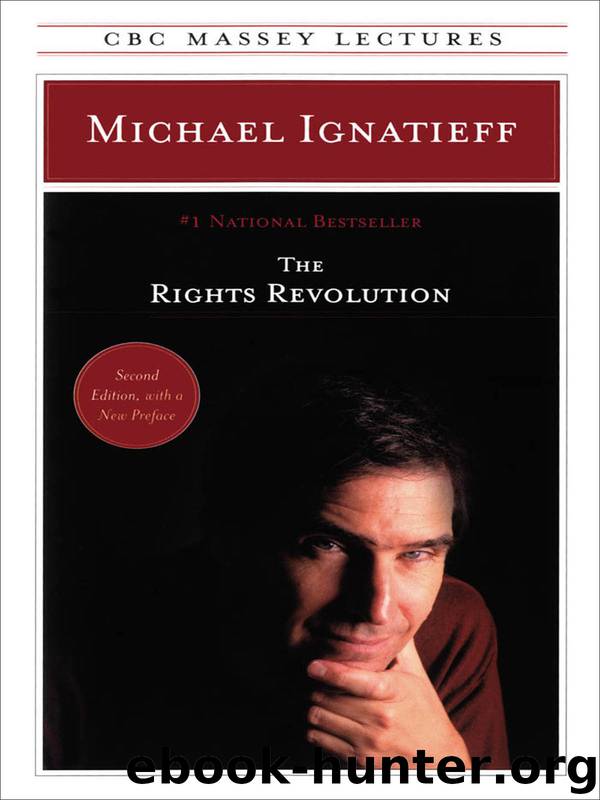The Rights Revolution by Michael Ignatieff

Author:Michael Ignatieff
Language: eng
Format: epub
Tags: POL004000
Publisher: House of Anansi Press Inc.
Published: 2007-02-01T05:00:00+00:00
V
RIGHTS, RECOGNITION, AND NATIONALISM
IN THE COURSE OF THESE LECTURES, I’ve retold the history of our country since the 1960s as a story of the struggle by different groups of citizens for rights and recognition. In this final lecture, it’s time to draw together the argument and ask a basic question: Has the rights revolution brought us closer together as a nation or driven us further apart?
The answer to the question depends on whose point of view you take. In these lectures, I’ve taken the point of view of the rights-claimants in these struggles: women seeking sexual and economic equality, aboriginal peoples seeking recognition of their title to land, ethnic minorities seeking protection of their culture, and same-sex couples seeking rights equivalent to those afforded heterosexuals. From their perspective, the history of the past forty years is a story of freedom painfully fought for and far from achieved. Unity, by and large, has not been their concern.
From the viewpoint of the bystander majority, however, the rights revolution has often seemed less about emancipation than about fragmentation, with the Canada they once knew taken apart and reassembled into a fractious collection of rival rights communities: gays versus straights, aboriginal peoples versus non-aboriginals, French-speakers versus English-speakers, immigrants versus native-born, abled versus disabled, rich versus poor. The rights revolution empowered these groups at the price of disempowering the majority. When a majority feels it is weakened, it is natural for it to believe that the country has been weakened as well.
Minorities have won recognition, and now it is the turn of the majority to look around and ask, in astonishment, whether it recognizes itself. Where is the majority any more? Who are we? Once we thought we knew: white, heterosexual, family-oriented, native-born people who were Canadians first and anything else second. Now the population is cross-cut with identities — sexual, racial, religious, and ethnic — making it difficult to speak of a Canadian majority at all. This may be one reason for the belief, widely held among our elites, that our country has become ever more difficult to govern. The essential work of national politics is creating majorities (i.e., national coalitions of interest). As the rights revolution fragments the majority, it fragments the coalitions that keep the country together.
The rights revolution also turns politics into an exchange of recrimination between victims and their supposed oppressors. It’s not that there aren’t real victims out there; the problem is that the majority has genuine difficulty accepting the idea that present generations remain responsible for the harms committed by past ones. How long must the Canadian majority continue to pay for the abuses done to aboriginal peoples in times past? How long must it do penance for racism, sexism, and other forms of injustice? It is clear that for many Canadians, the debate over past injustice produces not mutual recognition but resentment. Victim and oppressor become co-dependent, locked into their roles and unable to shed them. The victim minorities resent depending on the majority for redress. The majority resents depending on the minority for forgiveness.
Download
This site does not store any files on its server. We only index and link to content provided by other sites. Please contact the content providers to delete copyright contents if any and email us, we'll remove relevant links or contents immediately.
| Anthropology | Archaeology |
| Philosophy | Politics & Government |
| Social Sciences | Sociology |
| Women's Studies |
The Secret History by Donna Tartt(16656)
The Social Justice Warrior Handbook by Lisa De Pasquale(11492)
Thirteen Reasons Why by Jay Asher(7800)
This Is How You Lose Her by Junot Diaz(5794)
Weapons of Math Destruction by Cathy O'Neil(5046)
Zero to One by Peter Thiel(4834)
The Myth of the Strong Leader by Archie Brown(4795)
Promise Me, Dad by Joe Biden(4454)
Beartown by Fredrik Backman(4429)
Stone's Rules by Roger Stone(4422)
How Democracies Die by Steven Levitsky & Daniel Ziblatt(4408)
The Fire Next Time by James Baldwin(4349)
100 Deadly Skills by Clint Emerson(4085)
A Higher Loyalty: Truth, Lies, and Leadership by James Comey(4038)
Rise and Kill First by Ronen Bergman(4018)
The David Icke Guide to the Global Conspiracy (and how to end it) by David Icke(3890)
The Farm by Tom Rob Smith(3878)
Secrecy World by Jake Bernstein(3788)
The Doomsday Machine by Daniel Ellsberg(3736)
